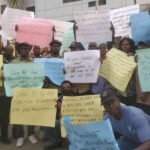President Bola Tinubu’s declaration that ‘enough is enough’ in response to the country’s worsening security crisis is a powerful statement, but it must be matched by decisive action.
Development Diaries reports that upon his return from France, President Tinubu voiced deep concern over the escalating security crisis in the country, and declared to National Security Advisor (NSA) Nuhu Ribadu and other security chiefs that ‘enough is enough’.
STATEHOUSE PRESS RELEASE
PRESIDENT TINUBU ISSUES NEW DIRECTIVES ON SECURITY, SAYS “ENOUGH IS ENOUGH”
President Bola Tinubu has directed an immediate and comprehensive overhaul of national security strategies, demanding urgent action to end the escalating violence in Borno,… pic.twitter.com/e5jc7gCm4W
— Bayo Onanuga (@aonanuga1956) April 23, 2025
Meanwhile, the NSA said that the security chiefs have taken the directives from the President and are acting accordingly.
The president’s declaration needs to be marked by action.
Nigerians are not dying for lack of rhetoric. They are dying because years of failed strategies, poor coordination, and insufficient accountability have allowed violent actors to operate with impunity.
In the past few weeks alone, over 200 people have been killed in attacks across Benue, Plateau, and Borno states, despite repeated claims that security agencies are ‘on top of the situation’.
The President’s words must now translate into a clear, time-bound roadmap to protect citizens and restore trust in the government’s capacity to provide safety.
Also, it is troubling that NSA Ribadu insists that the security situation has ‘improved for better‘, when recent events show otherwise.
In Benue State, more than 50 lives were lost in a single week due to attacks by suspected armed herdsmen. In Borno, IED explosions have claimed more innocent lives, while coordinated raids in Plateau State have displaced entire communities.
These are not minor setbacks, they are indicators of a security architecture still failing. Downplaying these tragedies shows a sad lack of understanding for the constant fear many Nigerians still have to deal with.
Beyond military deployments and elite briefings, a people-centred approach is urgently needed.
Communities on the frontline of violence require consistent engagement, early warning systems, and locally driven security solutions.
While Ribadu noted that governors and subnational actors must be part of the solution, the federal government must lead with urgency, consistency, and transparency.
Security outcomes must be tracked and publicly reported, not hidden behind closed-door meetings and press soundbites.
Ultimately, Nigerians do not want to hear that ‘things have changed’ if the only evidence of that change is found in Abuja boardrooms.
They want to sleep without fear of being attacked. They want their children to go to school without dodging bullets.
Until concrete steps are taken, until perpetrators are arrested, victims compensated, and citizens meaningfully involved in peacebuilding, ‘enough is enough’ will remain just another quote in the long archive of unfulfilled promises.
Development Diaries calls on President Tinubu and his security chiefs to take responsibility for closing the gap between security policies and the lived realities of citizens.
Photo source: Bayo Onanuga







